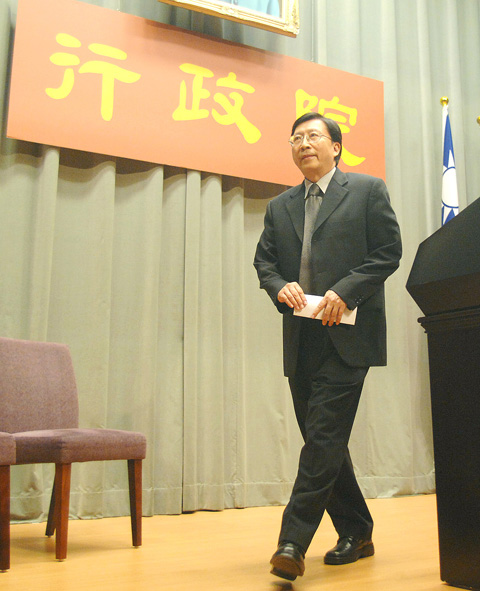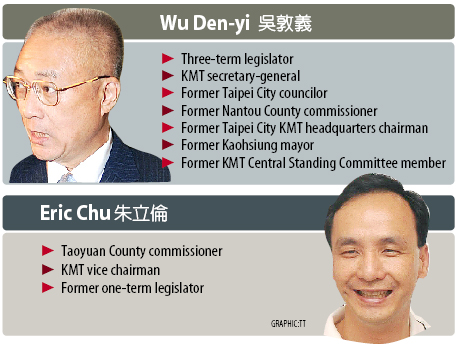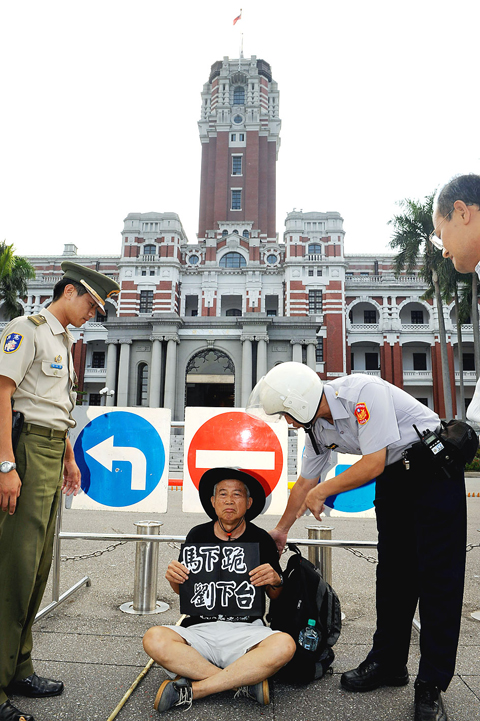Premier Liu Chao-shiuan (劉兆玄) took everyone by surprise yesterday afternoon by announcing that President Ma Ying-jeou (馬英九) had accepted his resignation.
Liu will lead the Cabinet in resigning during the Executive Yuan’s weekly meeting on Thursday, Liu told a 4:30pm press conference.
Shortly after his announcement, the Presidential Office said Chinese Nationalist Party (KMT) Secretary-General and Vice Chairman Wu Den-yih (吳敦義) would replace Liu, while Taoyuan County Commissioner and KMT Vice Chairman Eric Chu (朱立倫) would become vice premier.

PHOTO: PATRICK LIN, AFP
“So many people died [in the aftermath of Typhoon Morakot]. I believe someone should shoulder the political responsibility,” Liu said.
“As premier, I should take full responsibility, so I tendered my resignation in the middle of August,” he said.
Liu said Ma wanted him to stay on, but he was determined to step down, adding that he had only agreed to stay on temporarily to preside over the beginning of reconstruction work.

Liu said that between 80 percent and 90 percent of Morakot victims had received stipends from the government, while 92 percent had been temporarily relocated to military camps or government dormitories.
The legislature also passed the Post-Typhoon Morakot Reconstruction Special Act (莫拉克颱風災後重建特別條例) and the Executive Yuan has submitted the related budget request to the legislature, Liu said.
“I have completed my mission for now. It’s time for me to leave,” Liu said.

PHOTO: CHU PEI-HSIUNG, TAIPEI TIMES
“As the highest-ranking government official in the nation, I should shoulder all political responsibility, so I tendered my resignation again. The president finally approved it,” he said.
Ma had supported him and they discussed the matter until late last night, he said.
Liu also apologized to Ma and the public for the performance of the Executive Yuan during the disaster.
“Many things should have been done better,” he said.
He thanked Ma, Cabinet officials, the various civic groups involved in disaster relief efforts and religious leaders.
“God bless the Republic of China. God bless the Taiwanese people,” Liu said.
Speaking shortly after Liu’s press conference, Presidential Office Spokesman Wang Yu-chi (王郁琦) said Ma met Liu on Sunday night and thanked him for his contributions over the past year.
The president also told Wu and Chu that they did not have the choice of rejecting the offer to serve the nation at such a critical time, Wang said.
Ma would finalize the new Cabinet with Wu “in a few days,” Wang said.
Wang said Ma and Liu had agreed last month that Liu would take responsibility for the disaster early this month and that Liu again offered to resign on Saturday after he returned from Kaohsiung, where he had been staying with some Cabinet officials to gain first-hand information on the disaster situation and relief work.
Ma began to ask about Wu’s interest in the premiership last Thursday and Chu’s interest in the vice premiership on Friday, Wang said, adding that the final decision was the president’s alone. Asked whether their appointments were related to the year-end elections, Wang said both men were chosen for their abilities and extensive political experience.
Chu’s term as county commisser was scheduled to end in December, Wang said, while Wu has served as Nantou County commissioner and Kaohsiung mayor.
Wang also praised Wu’s experience in party and administrative affairs, adding that Wu and Ma were “old friends” who understood each other very well.
Chu was an outstanding young talent, Wang said.
Faced with such a “tough task,” Wu told reporters that he hoped to continue the work of Liu’s team to improve the economy. He also said he would step down from his two KMT posts.
The Democratic Progressive Party (DPP) caucus praised Liu and his Cabinet for resigning, but expressed surprise at Wu’s appointment.
DPP lawmakers, who watched the Presidential Office’s announcement of Wu’s appointment on TV, lauded Liu’s resignation and said Ma was truly one of the world’s “gutsiest” leaders, as he has been described by the US satirical magazine, mental_floss.
“It was a day full of surprises,” the lawmakers said.
DPP Legislator Chai Trong-rong (蔡同榮) said Liu resigned because he had listened to the public, adding that he hoped the new Cabinet would be more efficient.
DPP Legislator Huang Wei-cher (黃偉哲) gave Liu credit for taking political responsibility and stepping down.
Liu’s resignation was in line with public opinion because many people were dissatisfied with the Cabinet’s performance, Huang said.
DPP Legislator Chen Ting-fei (陳亭妃), however, said Liu should have resigned earlier, adding that Ma had only approved Liu’s resignation because public feeling was so overwhelming.
The DPP caucus slammed Wu’s nomination as “unacceptable.”
KMT Legislator Lo Shu-lei (羅淑蕾) also lauded Liu for stepping down and gave Wu her best wishes.
Asked if she had any reservations about Wu’s ability to be premier, Lo said: “Ask other members [of the KMT caucus] and you will see.”
She did not elaborate.
Meanwhile, Ma was heckled by a typhoon victim in Pingtung County yesterday. The woman asked that Ma step down if Liu refused to resign to take responsibility for the government’s slow response to Morakot.
Chanting “This man should step down” and holding a banner that read “Why not come for a long stay?” the woman said the government’s relief efforts had embarrassed the country.
“He [Ma] is staying in an air-conditioned room. He should come down here to see things for himself,” she said. “They clean the streets before he comes, but it is superficial.”
The government held a national memorial service for typhoon victims in Kaohsiung yesterday, but one survivor said he could not attend because there was no transportation.
Another woman said she could not go because the engine of her car was gone.
In related news, former president Lee Teng-hui (李登輝) said in Japan yesterday that many Japanese friends had given him donations for Morakot victims because they didn’t know how or where to send the money.
Meanwhile, representative to Japan John Feng (馮寄台) declined to comment yesterday on why he was in Europe at the height of the disaster.

DAREDEVIL: Honnold said it had always been a dream of his to climb Taipei 101, while a Netflix producer said the skyscraper was ‘a real icon of this country’ US climber Alex Honnold yesterday took on Taiwan’s tallest building, becoming the first person to scale Taipei 101 without a rope, harness or safety net. Hundreds of spectators gathered at the base of the 101-story skyscraper to watch Honnold, 40, embark on his daredevil feat, which was also broadcast live on Netflix. Dressed in a red T-shirt and yellow custom-made climbing shoes, Honnold swiftly moved up the southeast face of the glass and steel building. At one point, he stepped onto a platform midway up to wave down at fans and onlookers who were taking photos. People watching from inside

A Vietnamese migrant worker yesterday won NT$12 million (US$379,627) on a Lunar New Year scratch card in Kaohsiung as part of Taiwan Lottery Co’s (台灣彩券) “NT$12 Million Grand Fortune” (1200萬大吉利) game. The man was the first top-prize winner of the new game launched on Jan. 6 to mark the Lunar New Year. Three Vietnamese migrant workers visited a Taiwan Lottery shop on Xinyue Street in Kaohsiung’s Gangshan District (崗山), a store representative said. The player bought multiple tickets and, after winning nothing, held the final lottery ticket in one hand and rubbed the store’s statue of the Maitreya Buddha’s belly with the other,

Japan’s strategic alliance with the US would collapse if Tokyo were to turn away from a conflict in Taiwan, Japanese Prime Minister Sanae Takaichi said yesterday, but distanced herself from previous comments that suggested a possible military response in such an event. Takaichi expressed her latest views on a nationally broadcast TV program late on Monday, where an opposition party leader criticized her for igniting tensions with China with the earlier remarks. Ties between Japan and China have sunk to the worst level in years after Takaichi said in November that a hypothetical Chinese attack on Taiwan could bring about a Japanese

‘COMMITTED TO DETERRENCE’: Washington would stand by its allies, but it can only help as much as countries help themselves, Raymond Greene said The US is committed to deterrence in the first island chain, but it should not bear the burden alone, as “freedom is not free,” American Institute in Taiwan Director Raymond Greene said in a speech at the Institute for National Defense and Security Research’s “Strengthening Resilience: Defense as the Engine of Development” seminar in Taipei yesterday. In the speech, titled “Investing Together and a Secure and Prosperous Future,” Greene highlighted the contributions of US President Donald Trump’s administration to Taiwan’s defense efforts, including the establishment of supply chains for drones and autonomous systems, offers of security assistance and the expansion of